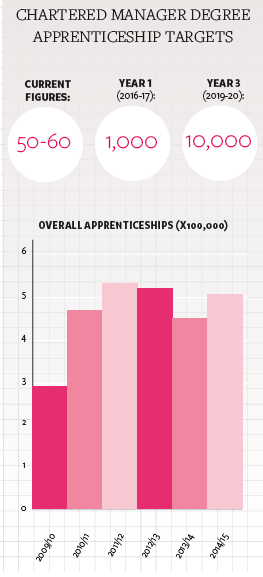Apprenticeships: Time to end the snobbery

“If businesses want a skilled workforce then it’s only right that they pay for it,” says CMI, as chancellor George Osborne heralds an apprenticeship revolution
Matt ScottThe way businesses train their future managers and leaders is set for a fundamental shift after chancellor George Osborne unveiled revolutionary apprenticeship reforms in his Autumn Statement and Spending Review.
The Conservative government’s reforms are set to increase the quality and quantity of apprenticeship schemes, while giving businesses more responsibility for the funding of apprenticeship training.

Speaking in the House of Commons, the chancellor described the apprenticeship programmes as “the flagship of our commitment to skills” and pledged to create three million apprenticeships by 2020.
He also promised an increase in funding to ensure the high quality of the programmes, and said the government is committed to spending twice as much per place on apprentices as when it came into office.
The reforms are also set to give businesses increased responsibility for the funding of apprenticeship programmes by way of an apprenticeship levy for larger employers.
Osborne has set the levy at 0.5% of an employer’s pay bill, with a £15,000 allowance to offset the cost for smaller companies, meaning that around 98% of companies will be exempt from the levy, with all those with payrolls under £3m having to pay nothing.
“Britain’s apprenticeship levy will raise £3bn a year. It will fund three million apprenticeships,” Osborne insisted. “It’s a huge reform to raise the skills of the nation and address one of the enduring weaknesses of the British economy.”
CMI director of strategy and external affairs Petra Wilton said it was time to end “apprenticeship snobbery” and called on employers to take responsibility for the future of their businesses. There may be some “grumbling in boardrooms” about the new levy, but “if businesses want a skilled workforce then it’s only right that they pay for it,” she said. “High quality professional managers don’t come for free so it’s time for businesses to put their hands in their pockets and invest for the future.
“Businesses must realise the value of upskilling their managers. Poor leadership and management is the biggest cause of the UK’s productivity shortfall, according to the latest OECD Total Factor Productivity figures.”
Do a degree, do an apprenticeship
CMI has been at the forefront of this apprenticeship revolution, launching the Chartered Manager Degree Apprenticeship in 2015 to offer a new way for businesses to develop their future leaders.
The Degree Apprenticeship programme has been developed for employers by employers, and offers apprentices completing the scheme on-the-job training, a degree from a leading business school and a Chartered Manager qualification from CMI.
CMI chief executive Ann Francke said the new Chartered Manager Degree Apprenticeship could be used by businesses to boost productivity and power the British economy.
“People are being asked to lead without training or support, with ineffective managers draining British productivity,” she said. “The Degree Apprenticeship programme addresses the core issue that a third of managers are rated as ineffective by their teams, a key cause for the UK’s poor performance in productivity.
“The new Chartered Manager Degree Apprenticeship ties together the training offered by educators and employers, with apprentices offered the threefold guarantee of a quality degree, on-the-job experience and a professional pathway for future development.”
Harry King, who started on the apprenticeship programme with Nestlé in September, said he is already feeling the benefit of the scheme and is adding value to his employer-sponsor.
“I’m currently getting practical work experience and you don’t see that with a lot of university qualifications,” he said. “This [programme] can kickstart your career even at the age of 19; I feel I am already adding value to the company two months in, so who knows where I am going to be in five years’ time.”
Professionalising the future
An ageing workforce is already having an impact on businesses.
Many are seeing experienced managers retire without adequate replacements. So professionalising the next generation of managers is more important than ever.
Nestlé head of talent acquisition Tom Banham said: “Nestlé is relying on an ageing workforce; we don’t have talented individuals coming through and driving us forward.
“Fifteen per cent of our skilled manufacturing team in the next 15 years is coming up for retirement, so a lot of knowledge and management skills will be lost.
“That’s why we built the Nestlé academy, which is purely focused on driving entry-level talent for our organisation and giving them different development opportunities. This programme is a fantastic opportunity for individuals joining our organisation: they get a Degree Apprenticeship from Sheffield Hallam University, they rotate through four commercial areas and, at the end of the three-year programme, they get a permanent opportunity at Nestlé, a degree and they become part of CMI.”
But while the Degree Apprenticeship programme is a big step, more needs to be done.
Wilton said: “We are already looking at apprenticeship level three, so that we have got routes into the profession and an open profession for all, so that whatever your starting point there is an apprenticeship there that can really help you.”
Find out more about the Chartered Manager Degree Apprenticeship here: managers.org.uk/degreeapprenticeships

Press & Media Enquiries
For more information or to request interviews, contact CMI's Press Team on 020 7421 2705 or email press.office@managers.org.uk


